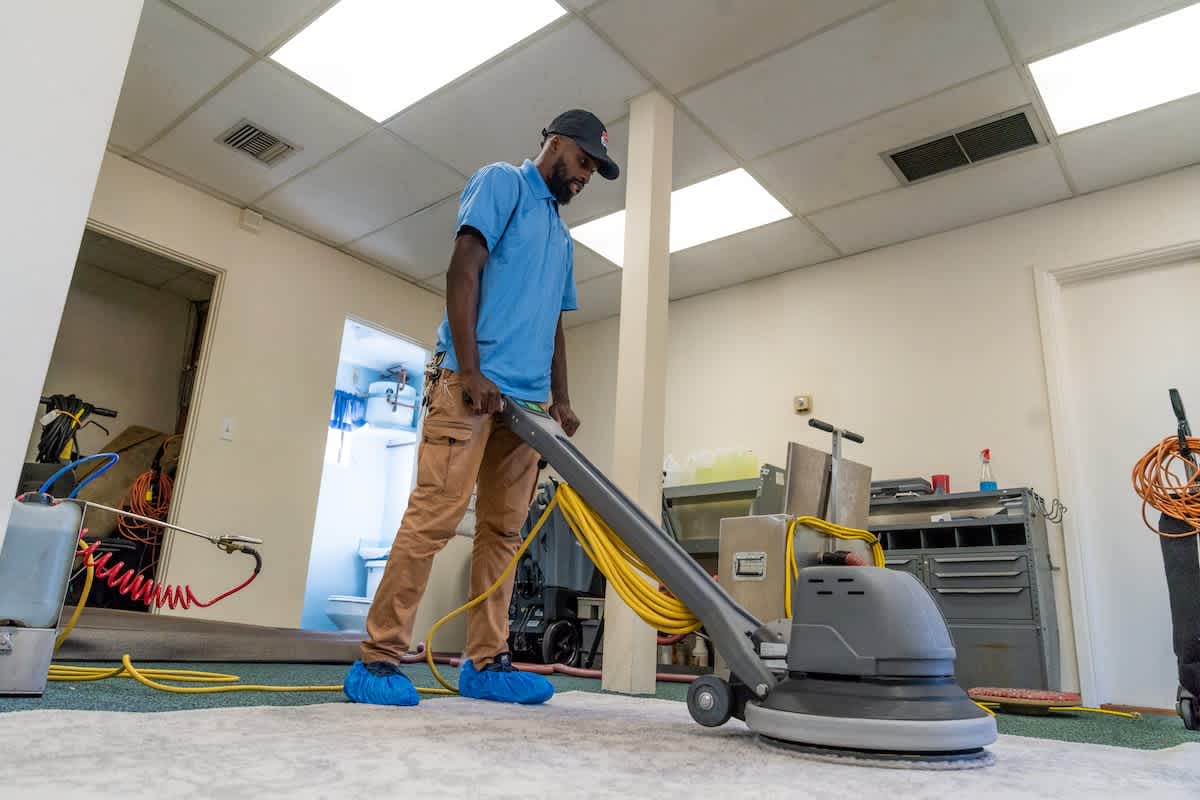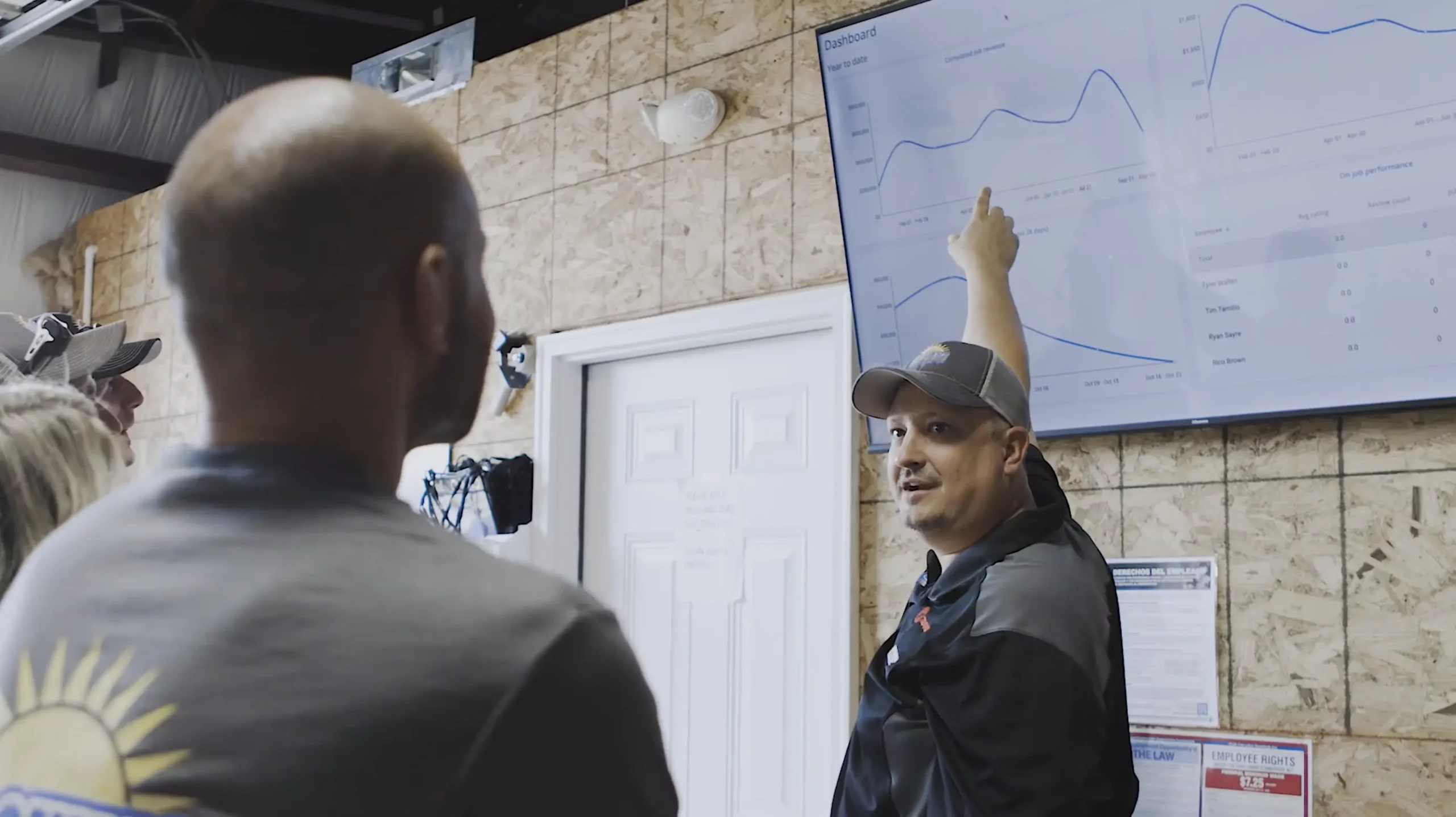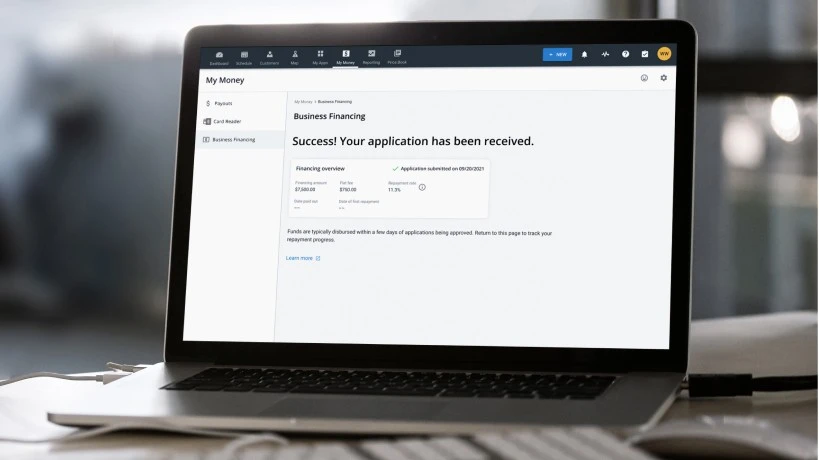
Compared to many other industries, starting a commercial cleaning business has lower start-up costs and legal requirements. And a commercial cleaning business has more room to scale than a residential cleaning business. While families may cut cleaning services to reduce costs, businesses will always need this service.
In other words, if you’re looking to start a commercial cleaning business, we think it’s a wise choice. But it’s not easy.
That’s why we’ve put together this guide which walks you through all the steps you need to take to get started. We’ve included real-life examples of business owners from around the U.S. and other industry expert opinions.
Finally, we’ve summarized all the steps in a downloadable checklist.
So let’s start with what it costs to start a residential cleaning company.
The difference between residential and commercial cleaning businesses
Folks who are new to the cleaning industry commonly question whether to focus their efforts on commercial or residential accounts. It’s also common for residential cleaners to want to expand into commercial.
Either way — if you’re new to the industry or looking to expand — it will be helpful to understand how these sectors are different.
Commercial can be easier to manage
“According to Sharon Cowan, CBSE, commercial gigs are much easier to manage. Sharon is the Chair and President of the Cleaning Business Consulting Group which coaches residential and commercial business owners on their financial and business goals.
“The commercial customer approaches janitorial services as something that was usually put on their plate to deal with, and they really don’t want to spend a lot of time on it. They just want someone to show up and do what they say they’re going to do. Whereas, when you’re dealing with the homeowner, you’re almost invading their privacy. You’re touching things that are personal,” Sharon explained.
For this reason, commercial cleaning contracts tend to be easier to manage because they’re less personal and emotionally charged.
In addition, the schedule is more consistent with commercial companies. When you’re scheduling residential cleanings, you might need to work around sick kids or forgotten appointments. Companies tend to set a cleaning schedule, then not change it.
Commercial is easier to scale
Commercial is easier to scale simply because each account is worth significantly more than a residential account. For instance, you might need to clean five houses a day to make a profit compared to two offices.
Residential has shorter sales and payment cycles
Where commercial may grow larger faster, it can be easier to get started in residential.
Melissa Arvizu ran her commercial business, Arvizu Commercial Cleaning, for over a decade before adding residential services. One of the things she has learned by doing both is how different the sales processes are. The main difference is how long it takes to sign on a new customer.
“The commercial side takes longer to develop, because if you have a service you’re probably not going to just up and cancel with them immediately. It’s going to take time, and it takes you being there at the right time to pick up that business. Whereas residential people are like, ‘I’m sick and tired of my house. Can you be here next week?’ It’s more of an immediate sales cycle,” Melissa said.
The other advantage is a shorter cash flow cycle. With a commercial client, you might need to go through several layers of bureaucracy to get your payment where a homeowner can simply pay out-of-pocket. When Sharon ran her own cleaning company, about 80% of her business was commercial and 20% residential. One of the primary reasons she held onto her residential clients was the quick and consistent payments.
Funding your cleaning business
When you’re first starting a business, it’s always good to keep your costs at the absolute minimum of what’s required. For example, instead of hiring cleaners, you may be the first cleaner on-site.
If you start lean, you might find that the startup costs are relatively low. You may have enough savings to cover the costs, or you can borrow smaller loans from your local bank or a third-party provider.
Steps
- Add up your business expenses
- Assess your personal expenses not covered by other income or savings
- Estimate your initial monthly revenue
- Calculate your break-even point
- Set revenue and profit margin goals
- Figure out your business credit score
- Compare financial options for your startup costs
- Write a business plan
The Importance of Knowing Your Numbers
“You can’t okay give profitable meaningful estimates unless you know your numbers and know how to do it,” Sharon explained. In the section on setting and pricing your services, we’ll go into more specifics on this. But the important part here is that you can’t set your prices until you solidly know here finances.
Start by listing out your expenses and your revenue goals. We recommend checking out Angela Brown’s system for tracking your business expenses. It’s a cheap and easy way to get started.
Sharon also recommends keeping track of your customer turnover rate and employee churn rate. “How fast are your customers going out the door, as well as coming in? There are some things you can’t control, but what exactly is making that happen?” The same goes for maintaining employees.
Tracking these statistics over a long period of time provides alternative ways to assess the health of your business than your revenue.
The legal stuff
To run your own business, you’ll need to register your business on the federal, state and local levels, including registering for a tax ID. You’ll need this ID to open a business banking account and get insured. If you’re not sure how to register, you can work with a registered agent.
Steps
- Make sure you have all the licenses you need
- Incorporate and register your business
- Apply for a tax ID
- Open business bank account
- Apply for insurance and bonding
- Set terms of service
Do you need insurance?
Accidents happen on the job, and you’ll want to be covered. It could make the difference between an insurance claim or the cost of replacing an entire scratched floor.
It’s even more important to have proper insurance when you begin hiring employees — even if they’re contract workers and not salaried. Check out Cleaning Business Today’s article about cleaning business insurance, especially on the necessity of a workman’s compensation program.
The International Janitorial Cleaning Services Association (IJCSA) offers insurance packages to their members, among other perks.
The technical stuff
Having the right technology behind your business can make all the difference when you’re looking to stand out. Features like automated invoices can make a major difference in your customer’s experience with your company. A quality customer experience leads to customer retention and referrals.
Steps
- Set up a website and social media profiles
- Shop for and invest in tech platforms (see chart)
- Create calls-to-action (CTAs) on your website and social media profiles
Software tools checklist
Here’s a breakdown of the different kinds of tech platforms you should consider investing in.
| Tools to Consider | Purpose | Examples Used by Our Pros | |||||||||
|---|---|---|---|---|---|---|---|---|---|---|---|
| Social Media Management | Schedule and automatically send posts; respond to messages across social media platforms in one place. | Hootsuite | Recurpost | eClincher | ZohoSocial | ||||||
| Email Marketing Manager | Manage email campaigns. | MailChimp | ActiveCampaign | ||||||||
| Customer Relationship Management | Track customer leads, maintain detailed customer histories. | Insightly | amoCRM | Pipedrive | Zoho | ||||||
| Field Service Management | Online booking & scheduling, job management, invoicing, and payment processing. | Housecall Pro | |||||||||
| Payroll and Accounting Management | Manage employee paychecks, expenses, and taxes. | Paychex | Quickbooks | ADP | Square Payroll |
Understanding the customer experience
The actual services you provide is a small part of the experience your customers have with your company. It also includes scheduling cleanings, the payment process, and how they get ahold of you with requests and complaints.
Your goal is to make their experience as seamless as possible.
1. Map out your customer’s journey
Today, so much of the customer’s experience with any company is done online, from emails to payments. It’s important to choose the best possible software that is not just easy for you to use, but is easy for your customers, as well. We suggest charting out the process of dealing with your company from your customer’s perspective to look for potential issues. How do they sign up for services? How do they pay? Try everything as if you were the customer to see if anything is difficult or confusing.
2. Make a customer profile
Each customer will have their own preferences and company policies. Maintain profiles for each of your customers. You never know when having this information on file will come in handy.
For instance, you should know:
- How your customers prefer to communicate with you (email, phone, etc)
- How they prefer to pay (check, credit card, online)
- Whether they prefer receipts emailed or sent via mail.
- How often they are comfortable being contacted with updates, promotions, check-ins, etc.
3. Ask how to improve
Check in with your customers about how you can improve the customer experience. Small changes can make the difference in customer retention and referrals.
Additional Resources
- Choosing a Payment Platform
- Anatomy of a Successful Service Business Website
- How to create a website that attracts customers
- Top 10 web hosting sites for small businesses
- 7 best credit card readers for small businesses
- Best text message marketing software and apps
Choosing your market and target audience
Instead of advertising general cleaning services, you can find a common market and offer specialized services.
Steps
- Outline your target market and ideal customer
- Decide if you want to specialize
- Update your brand messaging and service offerings accordingly
Who is your ideal customer?
There are major differences in price and expectations between cleaning a restaurant, an attorney’s office, and a medical facility. The industries you choose to serve will grow your business in specific ways. For instance, some industries pay better than others, some require after hour cleanings while others are during the day, and some require special certifications and expertise.
People gravitate towards businesses that know their industry. If you’re speaking to a potential client about cleaning their gym and you already have a gym client, it’ll help build trust. You’ll also start to be referred within an industry. One gym owner will tell another gym owner about their reliable janitorial company.
You can always pivot
If you try out specific industries and realize you like one more than another, you can focus your attention on that industry. You might figure out that you and your staff enjoy working on offices over restaurants, and you discover that you make a bigger profit with those customers, as well. You now know which new customers you want to attract.
Keep in mind that it’s okay to turn down jobs! If you’re not going to make a profit or you don’t have the staff in place or the right skills, then it might not be the right opportunity for you. Turn down work to leave your schedule open for better opportunities.
Not sure where to start?
Sharon suggests going after financial industries, such as banks and wealth management firms. “Those kinds of businesses typically have a higher end clientele. It’s important to them that their office space is pristine and clean, and they’ll pay a higher price.”
Growing into larger markets
Companies can get requests for services they’re simply not ready for, such as big medical buildings or research parks which can require specialized skills and processes, as well as a larger employee base. It’s better to turn down the offer than to do a bad job.
Other markets, such as municipalities, will be looking for large companies that can handle massive jobs. They’ll search for companies through a request for proposals (RFPs) as opposed to more informal processes. You can build these kinds of bids into the long-term plan for your company.
Adding specialized services
Another way to grow is to add specialized services, such as post-construction cleaning or floor and carpet cleaning. Trying to figure out the best way to expand? Try these methods:
Run a cost-benefit analysis
Investigate what it would take to get started in a different specialty: what new equipment you’d need, the training required, etc. Figure out the going rate in your area for the service, and see what you’d need to charge to make a profit.
Ask your customers
Ask your current customers what additional services they could use. Are they getting ready to add on to their building? Would they be willing to switch to you for their floor or carpet cleaning services? Figuring out what your clients needs adds new value to your existing relationships.
Setting your services and rates
Figuring out what you should charge is a major stressor for new and young businesses, and undercharging is one of the most common reasons that new businesses don’t make it. We’ll look at some tips on how to price your services to be competitive and make a profit.
Steps
- Create a list of services you’re able to or interested in offering
- Create a price list for all of your services
- Create a contract template
- Write up a terms and conditions document
Tips on How to Price Your Services
1. Your prices should ALWAYS be informed by your expenses
One of the most common issues is not charging enough. You’re worried about being outbidded for jobs, so you underprice your services. But when you don’t make a profit, the business isn’t sustainable.
Since long-term contracts are common in the commercial cleaning industry, make sure you break down the total amount to see if it covers your variable costs and a percentage of your fixed costs. Always keep in mind what your revenue goals are. What profit margin do you need to meet those goals?
2. Know who the decision makers are
If you’re working with a specific industry, you need to understand how that industry works. The person who talks to you about services might not be the one who actually makes the hiring decisions. Knowing who the decision makers in the company are can help you close the deal. Why? Because they might care about different things than their office manager or assistant. You should be prepared to answer their questions and meet their conditions.
We recommend you talk to a manager who’s worked in the industry you’re pursuing to understand how it works and what their values are.
3. Don’t ask for pricing advice online
“Asking pricing information on social media is one of the biggest faults that new owners have. You’re asking people that live in a different part of the country that don’t have your car expenses or labor costs, and are totally different from you to tell you how to price,” Sharon explained.
It’s useful to know what the going rate is in your area, but realize that rates vary widely across the country and in different industries.
4. Don’t use residential pricing
If you’re coming to commercial cleaning from the residential side, you can’t use the same pricing logic. If you’re thinking simply square footage, the pricing doesn’t translate.-
The same basic concepts apply: know your costs, know how long the job will take, know what profit margin you’re aiming for and price accordingly. What’s different is the actual cleaning services you’ll offer.
Residential cleaning tends to include much more details that isn’t necessary for most commercial cleaning contracts. “In general, the pricing is too high for commercial because they don’t want to pay for a housecleaner to come in and detail it out like they would a house,” Sharon explained.
Marketing and advertising
When it comes to advertising, there’s no one perfect strategy. What works well can vary based on your location, your target customer, specialization, and simply what you’re good at. But before you spend tons of money on advertising, we recommend building up your online presence and in-person networking. These strategies can save you money in the long-run and help you find organic leads.
Steps
- Create a marketing plan
- Design business cards, car or van wrap, and other marketing materials
- Sign up for Google My Business
- Claim your business on other lead generation platforms
- Optimize your website for search engines (SEO)
- Join digital and in-person networking groups
Building a brand
According to Sharon, most businesses won’t search on sites like Angie’s List or Thumbtack for cleaning companies the way that homeowners might. They’ll be looking for businesses through networking events and referrals.
“Price does matter, but most businesses want to do business with reputable companies: companies that have a good reputation and have donated to community charities. Those kinds of things are important in coordination with digital marketing and all the online marketing efforts that you do,” Sharon said.
Reputation matters a lot in this industry, which is why it can be difficult to get started: you haven’t built one yet.
Build online and in-person at the same time
You are more likely to score your first clients in person, but your online presence still matters. Many potential customers that you meet at an event will look for your website and social media presence to gage how professional and established you are.
Sharon suggests attending events hosted by your local chamber of commerce or Business Network International (BNI) to start building relationships with businesses.
Establish a presence in the industries you’re targeting
When you know what types of businesses you want to target, become a known name in their industry. Host luncheons for their industry, have a booth at local conferences and events. You’ll not just meet potential customers, but you’ll learn more about the industry and how to serve it better.
Establish a presence in your city or town
Especially if you’re looking to grow in a specific neighborhood or a smaller town or city, you can develop a positive reputation by becoming involved in the community, as well. Sponsor a little league team or a local parks and recreation event. Giving back to the community will earn you karma and customers.
Additional resources
- How to Get Clients Before You Launch
- How to Encourage Customers to Write Online Reviews
- How to Remove Bad Reviews from Google Local, Facebook, and Yelp
Hiring
For nearly every cleaning business owner we’ve talked to, maintaining quality cleaning technicians is their biggest stumbling block. Learn from these cleaning business experts about how they find and keep good workers.
Steps
- Assess the numbers (what can you afford?)
- Research the legal requirements (federal, state, and local) of hiring someone
- Outline the hiring and onboarding processes
- Set up functions to handle salary and benefits
- Create job listing ad
How to hire
Kim and Jason Johnson, owners of Premier Janitorial Service, explain how they’ve improved their hiring process on an episode of the Grow My Cleaning Company podcast. Kim and Jason used to spend an entire day one day a week hiring with constant turnover. They’d start with one-on-one interviews, sitting in a coffee shop or a library all day and might get one new hire out of an eight to ten hour time commitment.
Now they spend two hours a week and have a quality staff of over 40 people. They have a continuously running add. Candidates respond to the add and get an automated email back that tells them when the next interview day is. Kim and Jason start with a group interview. If anyone stands out, they move on to a one-on-one interview the next day. From there, Kim and Jason hand the candidate off to their team leads to do a week-long working trial. “If they all say ‘Hey, they’re good,’ and we get two or three opinions, then they’re a team member. They’re with us for a week to ten days before they’re technically part of the team,” Jason explained.
Additional Resources
- Employee retention and hiring tips from our pros
- 20 of the best time clock apps for small businesses
Where to go from here
You’re not alone if you find the process of starting a new business overwhelming. And this is exactly why community is so important.
Check out our Mastermind events to network and learn from other service businesses.
Also consider joining these trade organizations:
- International Sanitary Supply Association (ISSA)
- International Janitorial Cleaning Services Association (IJCSA)
- United Professional Cleaning Alliance (UPCA)
For general business resources, we recommend:
- The US Small Business Administration (SBA)
- SCORE
- Entrepreneurs’ Organization
- National Small Business Association (NSBA)
- National Small Business Association (NSBA)
Check out a longer list of small business associations.
Finally, don’t forget to download the ‘How to Start a Commercial Cleaning Business Checklist’ — a summary of all of the steps we went over in this guide.






